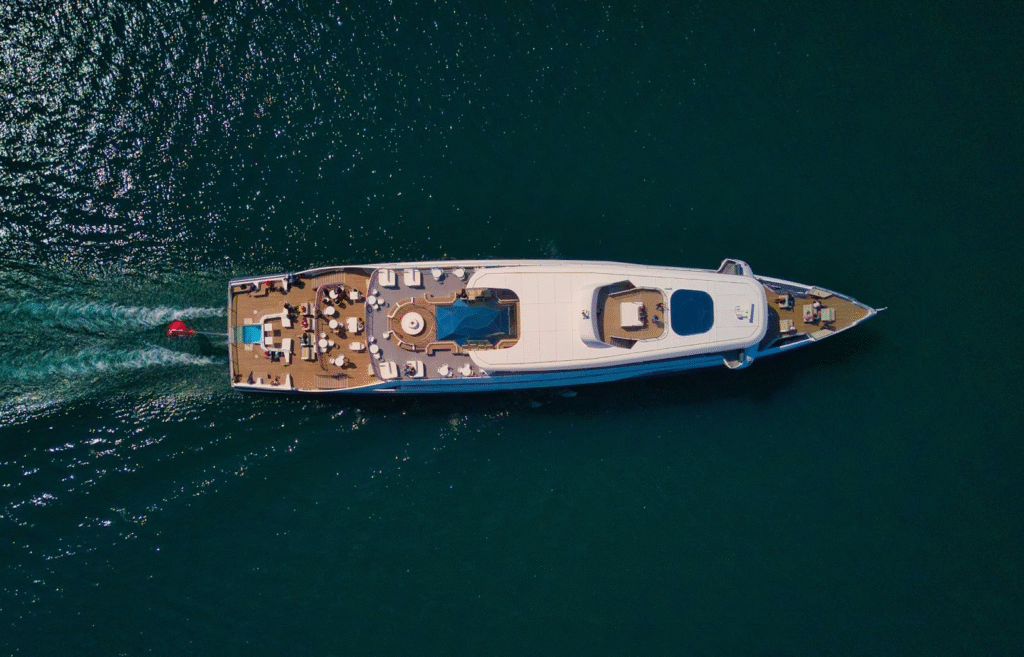Introduction
For centuries, human communities have expanded to rural cities, states and empires. But by 2025, a groundbreaking change has emerged challenging the big definition of a nation. A floating nation, when a radical idea is limited to the fantasies of future people, is now a reality. These man-made, ocean-based communities are more than just floating cities-represent a whole new approach to sovereignty, economics and human settlement.
Birth of temporary nations
The concept of floating nations arose from the need to cope with the two biggest challenges with humanity: the sea level is increasing due to climate change and demand for new, sustainable residential sites. Over the past decade, engineers, environmentalists and visionary projects combine advanced maritime architecture with renewable energy systems.
In 2025, the world first saw the official recognition of the sovereign floating nation, which was made on the modular platforms capable of understanding the tough weather, producing its power and producing fresh water through splinification. These floating nations are designed as a self -sustaining society with food production, housing, schools, hospitals and management systems.
Climate change as a motivating force
One of the main causes behind the rapid development of temporary floating nations is climate change. The rising oceans have threatened the coastal areas and displace millions worldwide. Counties such as the Maldives, Tuvalu and parts of Bangladesh face the possibility of losing important parts of their country.
Instead of waiting for the disaster, the innovators have turned to the sea for the solution. Liquid nations not only provide safe asylum, but also show flexibility against climate-operated destruction. They are made on platforms designed to get up and fall with tides, making them immune to floods and increase in sea level. This makes them a symbol of hope for countries facing existential threats.
Ocean Highway: Business and Connection
The emergence of floating nations is now also called Ocean Highway, which is nominated for the mainland ports and routes connecting the floating cities with each other. These highways act as maritime superheaver, which allows fast trade, tourism and cultural exchange.
Liquid nations are strategically located near the shipping lane, making them a hub for global trade. With advanced docking stations and futuristic loading systems, they bring revolution in platform logistics. Instead of relying only on land -based infrastructure, shipping companies can now optimize the routes using liquid hubs such as transit points. This integration of temporary countries into global trade marks the beginning of a new economic time.
Governance and sovereignty on the sea
Perhaps the most controversial aspect of temporary nations is the question of governance. Who controls the seas, and how do these ocean -based countries establish their sovereignty? By 2025, international bodies such as the UN have been forced to meet these issues.
Some floating nations act as independent states, release passports, currencies and even set their own tax systems. Other established countries act as semi-plate areas under the protection of land. It arises about the rights of citizens living beyond maritime law, regional water and traditional borders.
The idea of ”viewing” – increasing new communities in the sea – has now been put into practice with theory. This challenge is responsible for balancing freedom with responsibility, and ensuring that these new nations contribute positively to the global system instead of becoming a legitimate sky.
Technology Behind Floating Nations

The success of temporary nations depends on state -art technology. The platforms are designed using lightweight, durable materials that are against rust and storm damage. Renewable energy sources – such as floating solar fields, tidal turbines and offshore wind turbines.
Food production depends on vertical agriculture, aquaponics and offshore fisheries, which reduces the dependence on imports. Water is supplied through large -scale organization plants, while advanced waste management systems recycle materials to reduce pollution.
Autonomous transport, including self -driving boats and drones, connects liquid nations with each other, while under -treated data cables and satellite networks ensure high -speed digital connection
Financial opportunities and challenges
Liquid nations become magnets for investments, especially reduced by industries in search of innovation -friendly environments. Technology companies, research laboratories and green energy companies are among the first people to install bases on these platforms. Tourism is a faster growing area, where futuristic floating resorts attract visitors.
However, challenges remain. Construction and maintenance of floating cities is expensive, and continuous innovation is necessary to ensure long -term stability. Questions about health care, education and social equity on these platforms are also required. Liquid nations should avoid becoming an exclusive enclave for the rich, while the weaker population continues to fight on the ground.
A vision of the future
The emergence of floating nations in 2025 is more than a technical achievement – it means being a nation that has a redistribution. They symbolize flexibility ahead of climate change, and show how people can fit environmental challenges, and give a glimpse into the future where the boundaries are not determined by the country, but defined by innovation.
When the sea roads are expanded and more temporary nations emerge, humanity can witness the beginning of a new geopolitical map -the sea where the sea is not only sent, but also the entire sovereign society. The first floating nation may be small, but the importance of them is enormous. They are the pioneers of a new civilization, mapping the course for a future where humanity is no longer bound by the borders of the country.
Conclusion
By 2025, temporary nations have converted from future dreams to specific realities. Inspired by climate change, technological innovation and the need for a new front, these ocean -based communities will convert global trade, governance and human disposal. The development of the Ocean Highway connecting these platforms to the world highlights their significance in the economy of the 21th century.
The journey is just the beginning, but the message is clear: humanity comes into a time when the seas are no longer obstacles – they are opportunities. Liquid nations stand as a will for human creativity and existence, proving that even in front of the growing seas, civilization will always have a way to get up.

